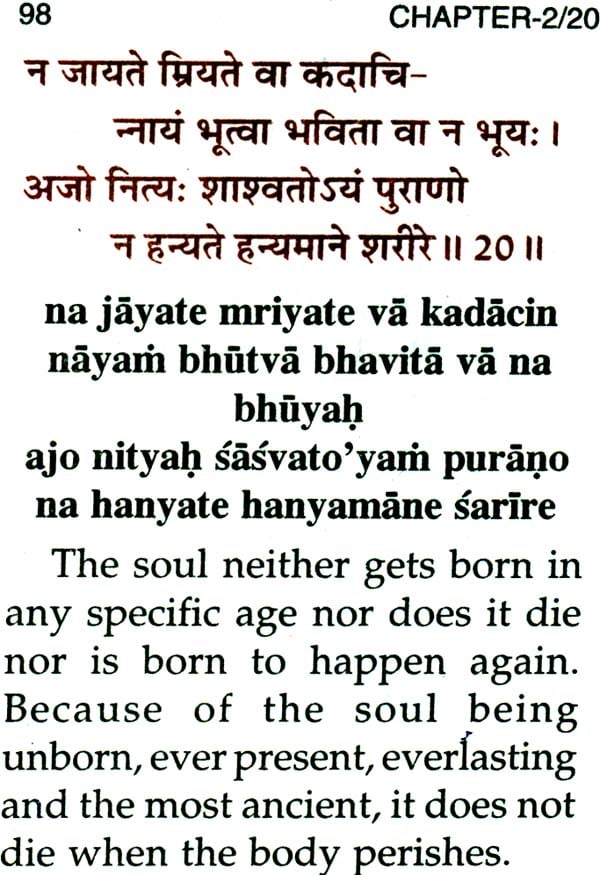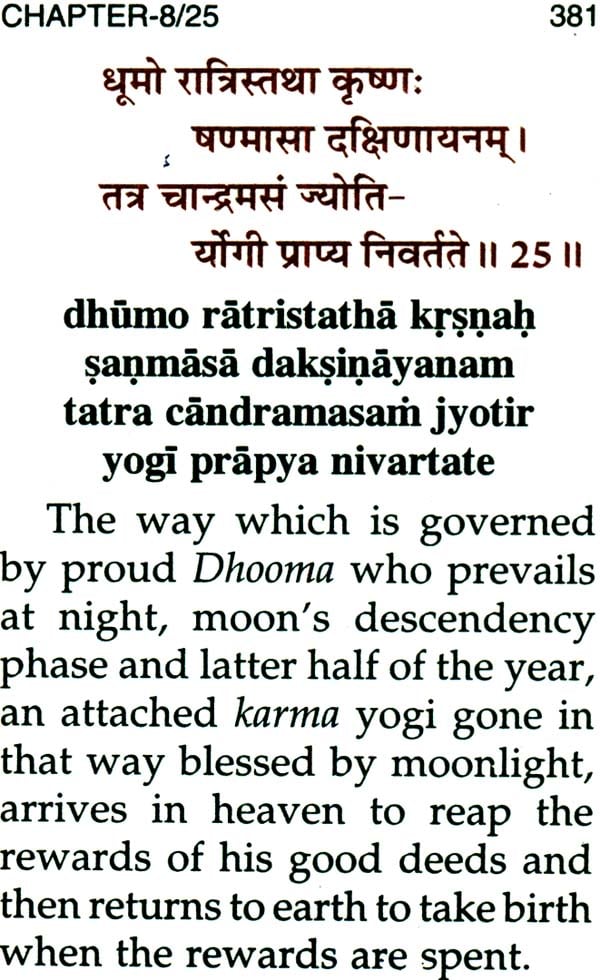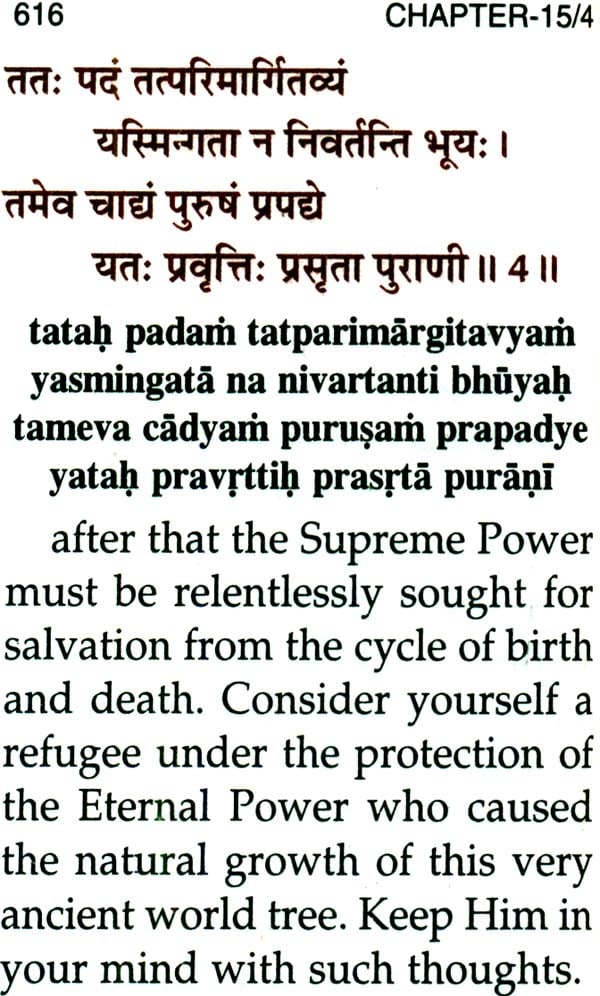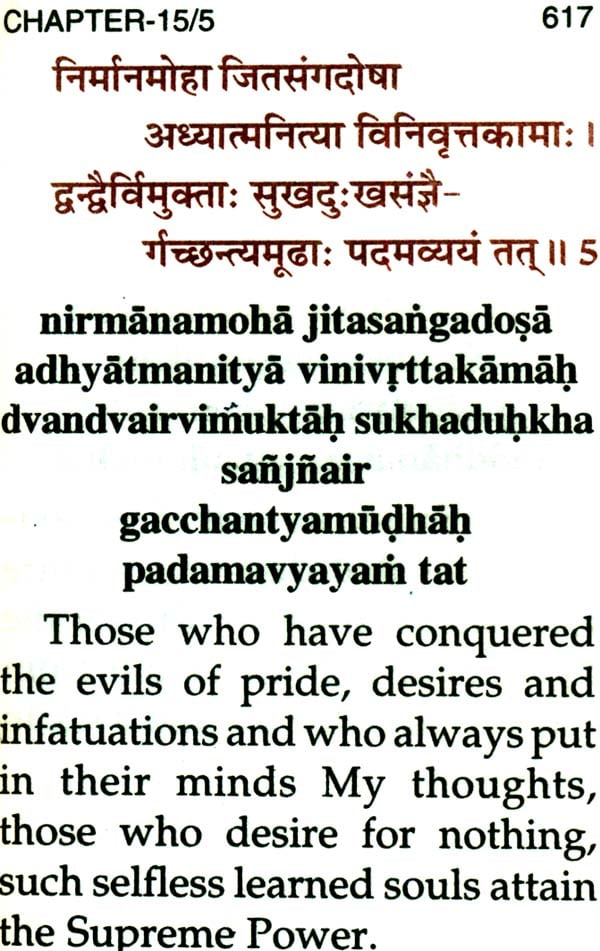
Shrimad Bhagavad Gita - Spiritual Philosophy of Practical Life (Small Size)
Book Specification
| Item Code: | NAO902 |
| Publisher: | Manoj Publications, Delhi |
| Language: | Sanskrit Text With Transliteration and English Translation |
| Edition: | 2015 |
| ISBN: | 9788131022931 |
| Pages: | 768 |
| Cover: | Hardcover |
| Other Details | 4.5 inch X 3.0 inch |
| Weight | 230 gm |
Book Description
The strangest and the most unprecedented was the background when the spiritual wisdom of the Gita was revealed. It came out in the form of the dialogues transpired between lord Krishna and Arjuna while they stood between the formations of the opposing armies ready for the battle. The spiritual philosophy contained therein is the essence of all the scriptures. It is not only limited to spiritual theology but also analyses psychology and prescribes practical follow-up. Thus, the Gita diagnoses spiritual conflicts and advises treatment. It is not meant for a particular religion or group but for the benefit of entire mankind. A human being is superior to all creatures by being the source of thoughts, emotions and planned action. The intelligence helps him to cultivate all his dormant qualities. The modern science has proved that humans can even reprogramme genes. No other creature can even dream of it. Humans can explore their inner selves to reach the spiritual heights. The Gita’s knowledge is a ladder to attain those heights and meet the Creator.
Lord Krishna has revealed the possibilities of various spiritual exercises including Karma Yoga. Karma is a natural reaction of a man. It leads to bindings and worldly trappings. The Gita teaches us ways to escape those bindings and trappings. Lord Krishna through the sermon of the Gita propounds the divine theory of selfless deeds and non-attachment to the rewards of deeds.
This Karma theory is quoted worldwide. He analyzed the manifest and unmans fest forms of the supreme Power. The Gita reveals the cosmic truth of God being present in all creatures in the form of the Soul uniting all living beings as life-energy. This union is further extended to non-living matter as God being Omnipresent. Through divine spectacle Lord Krishna demonstrated to Arjuna how God contains everything visible in the cosmos and all the invisible forces. So, nothing matters in this world because only thing that matters is God.
The spiritual revelations drove away all the confusions and mental conflicts Arjuna was suffering from. What He told Arjuna is relevant to every human being. The Gita helps one understand the universe and he cosmic spectacle through the vision of the spiritual knowledge. It explains the relation of one’s soul to the body, the soul’s relation to the Supreme Power and how everything is related to everything else. Once the message of the Gita is understood, one can feel one’s self extended into all other creatures, living beings, things, happenings and the Ultimate Truth, God. Then no confusions and conflicts can haunt the mind and the soul is liberated from all the feelings of guilt and remorse.
| First Chapter: Arjunvished yoga | Shlok |
| The count of the main warriors of the both sides | 1-11 |
| Both armies sound conchshells | 12-19 |
| Arjuna surveys the armies | 20-17 |
| Arjuna reveals his confusions and doubts | 28-47 |
| Second Chapter: Sankhya yoga | |
| Lord krishna's advice to Arjuna | 01-10 |
| Sankhya yoga explained | 11-30 |
| Arjuna remided of his Dharma (Duty) to engagein the battle | 31-38 |
| Karma Yoga referred to | 39-53 |
| The definition of the balanced mind | 54-72 |
| Third Chapter: Karma Yoga | |
| Desirability of doing duty remaining unattached | 01-08 |
| The need of Yagnas | 09-16 |
| Deeds for setting examples | 17-24 |
| The differences between the ignorant and the learned | 25-35 |
| Avoidance of Kama | 36-43 |
| Fourth Chapter: Gyankarma Sannyass yoga | |
| Karma Yoga and to of improtance manifest God | 01-18 |
| The conduct of the Yogi and his gratness | 19-23 |
| Various Yagnas defined | 24-32 |
| The glory of knowedge | 33-42 |
| Fifth Chapter: Karmasannyaas Yoga | |
| Comparison between 'Sankhya yoga and Karma Yoga | 01-06 |
| Sankhya Yogi and Karma Yogi The sign and the importance | 07-12 |
| Gyan Yoga explained | 13-26 |
| Devotion and meditaion explained | 27-29 |
| Sixt Chapter: Aatmasanyam Yoga | |
| Karma Yoga-Subject and the sign of the Master Yogi | 01-04 |
| Sel-realistion and the divine person | 05-10 |
| Details of the meditation | 11-32 |
| Processes of controlling the mind | 33-36 |
| Yoga-failed person's fate and the glor of the meditative yogi | 37-47 |
| Seventh Chapter: Gyanvigyan Yoga | |
| Science and wisdom explained | 01-07 |
| The presence of God in all things as the cause | 08-12 |
| The evil and the faithful | 13-19 |
| The rewards of the devotion the lesser gods | 20-23 |
| The evil of non-bilievers and the goodness of the faithful | 24-30 |
| Eight Chapter: Akashabrahma Yoga | |
| Arjuna's questions on Brahm, spiritualism, karma, etc.-Lord Krishna's revelations | 01-07 |
| The Bhakti Yoga defined The two ways of the depature to the other world | 08-22 |
| Ninth Chapter: Rejvidyarajguhya Yoga | 23-28 |
| The greatness of the knowledge and wisdom | 01-06 |
| The origin of the world | 07-10 |
| The evil of the bad ones and the kinds of worship | 11-15 |
| God's dimensions revealed | 16-19 |
| Attached and unattched devotion | 20-25 |
| The superiority of the unatcahed worship | 26-34 |
| Tenth Chapter: Vibhooti Yoga | |
| The diviine attributes of the Almighty and the power of Yoga | 01-07 |
| The rewards and the consequences of the devotion | 08-11 |
| Arjuna prays to God and wishes to know His attributes and the power of yoga | 12-18 |
| Lord Krishna explains God's dimensions | 19-42 |
| Eleventh Chapter: Vishwaroopdarshan Yoga | |
| Arjuna's request for the show of the spectacle of divine dimensions | 01-04 |
| Lord krishna obliges | 05-08 |
| Sanjay narrates to Dhritrashtra the incredible sight of the divine spectacle | 09-14 |
| Arjuna is overwhelmed and prays to God | 15-31 |
| Lord explains His powers and inspires Arjuna for taking up arms as his sacred duty | 32-34 |
| he frightened Arjuna prays to all consuming from recealed | 35-46 |
| The glorification of Cosmic From | 47-50 |
| Twelfth Chapter: Bhakti Yoga | 51-55 |
| The devotion to manifest and unmanifest forms of God The ways to meet to Creator | 01-12 |
| The signs of enlightened perosns | 13-20 |
| Thirteents Chapter: Kshetrakshetragyavibhag Yoga | |
| The fields and the master of the field | 01-18 |
| The knowledge on the nature and the master | 19-34 |
| Fourteenth Chapter: Gunatrayvibhag Yoga | |
| The glory of knowedge and the origin of the creation by Nature God | 01-04 |
| The definition of Setva, Raja and Tama tendencies | 05-18 |
| The ways to attain the union with God and the signs of the accomplished one | 19-27 |
| Fifteenth Chapter: Purushottam Yoga | |
| The world tree and the fruit of the Ultimate Salvation | 01-06 |
| The form of the soul in a living being | 07-11 |
| The form of God | 12-15 |
| God in abstract symbolic forms | 16-20 |
| Sixteenth Chapter: Daivasurampadvibhag Yoga | |
| The divine and the evil tresures | 01-05 |
| The signs and the fate of the owners of the evil treasures | 06-20 |
| The renunciation of the evil ways and the advice to follow the path prescribed by the Dharma | 21-24 |
| Seventeenth Chapter: Sharddhatrayvibhag Yoga | |
| The forms of the devotion or worship | 01-06 |
| The Food, Yagna, Penance and Charity defined according to the three basic tendencies | 07-22 |
| The importance of Om-Tat-Sat | 23-28 |
| Eighteenth Chapter: Mokshasannyas Yoga | |
| The sacrifices | 01-12 |
| Sankhya principle in respect of Karma | 13-18 |
| The Definitions of knowledge, Karma, wisdom, fortitude and pleasure according to the tendencies | 19-40 |
| The professions and the duties | 41-48 |
| The glory of the faith | 49-55 |
| Karma Yoga with devotion | 56-66 |
| The glory of Gita | 67-78 |











